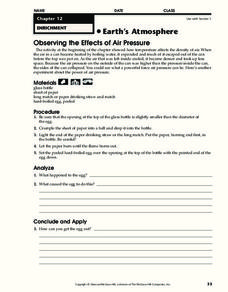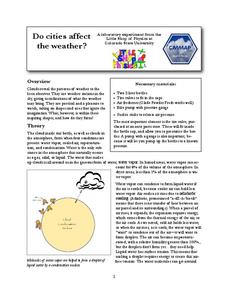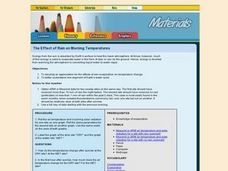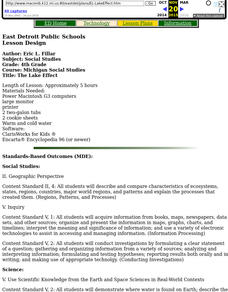College Board
2010 AP® Environmental Science Free-Response Questions
Scientists rely heavily on data to make predictions and find solutions. Young scholars become scientists as they analyze information presented to them to construct responses. They consider scenarios related to air pollution, invasive...
Curated OER
The Air Around You
In this air worksheet, students will answer questions about the Earth's atmosphere, including the layers, air masses, and heat transfer. Students will explore how the difference in atmospheric temperature can create weather patterns....
Curated OER
The Power of Atmospheric Pressure Process
Students are introduced to the basic principles of atmospheric pressure. After watching demonstrations, they discover the capability of air pressure and how it affects weather. In groups, they use an inquiry template to solve different...
Curated OER
Temperature in The Atmosphere
In this science worksheet, students find the answers to the five questions and they fill in the graphic organizer for the temperatures found in different heights of the atmosphere.
Curated OER
Earth's Atmosphere
In this Earth's atmosphere worksheet, students observe the effects of air pressure using an egg. They describe what happens to the egg and what makes it do what it does. Then they determine how to get the egg out of the bottle opening at...
Curated OER
Atmospheric Processes -- Convection
Students work together to discover how temperature changes can affect the density of water and air. They make predictions on what they believe is going to occur. They answer questions to complete the lesson plan.
Curated OER
The Goldilocks Principle: A Model of Atmospheric Gases
Learners discuss the characteristics of the Goldilocks Principle. They discover the pressure and chemical composition of Venus and Mars. They discuss how the Earth's temperature is affected by the atmosphere.
Curated OER
Is Air a Fluid?
Students use baking soda, vinegar, matches, and other materials to pour gas. In this air lesson plan, students use the materials to pour gas and learn that air can be a fluid like a liquid.
Curated OER
Sea of Air #2
In this air worksheet, students name gases found in the air, what gases are removed from the air during different processes, and determine what happens to air if there are changes in pressure, volume, or temperature. This worksheet has 1...
Curated OER
Air Pressure and Wind
Fifth graders study air pressure and learn how it can change the weather. In this air pressure lesson, 5th graders study the given diagrams and complete the experiments to learn how air pressure can change the weather. Students read...
Curated OER
Weather Lesson 1
Students describe and compare the layers of the atmosphere. They explain how to measure the temperature of the atmosphere. They also explain what causes the atmosphere to heat up in some places more than in others.
Curated OER
Weather
In this earth science instructional activity, students use the clues given at the bottom of the sheet to solve the crossword puzzle related to weather. They identify various cloud types and how they are formed. Students also identify...
McGraw Hill
Planetary Variations Interactive
Planetary atmospheres vary greatly from planet to planet. Explore these variations by experiencing the motion of the atmospheric molecules through an engaging simulation. Pupils discover that temperature and mass contribute to the...
Curated OER
Atmospheric Processes - Radiation
Young scholars investigate how different surfaces absorb heat, and how the physical characteristics of a surface have a powerful effect on the way a surface absorbs and releases heat from the sun.
Colorado State University
Do Cities Affect the Weather? (Making a Cloud in a Bottle)
The dynamics of a city can have a drastic effect on the weather. A hands-on lesson asks learners to build a model to illustrate how city pollution provides a nucleus for condensation. The greater the pollution, the greater chance for...
Virginia Department of Education
Charles’ Law
Searching for a relatively interesting way to demonstrate Charles' Law? Here is a lesson in which pupils heat air inside a flask and then cool the flask to quickly cool the air. They make observations about what occurs during the cooling...
Curated OER
The Effect of Rain on Morning Temperatures
Eighth graders study the effects of the water cycle. They create a graph of the air temperature versus solar radiation on a rainy and clear 24 hour period using data from a provided link. Afterward, they answer questions to determine the...
Curated OER
The Lake Effect
Fourth graders conduct an experiment demonstrating the effects of water and air temperature on precipitation. They create graphs demonstrating their findings using Claris Works for Kids.
Curated OER
Cold, Clouds, and Snowflakes
Young scholars explore satellite data and graphing. In this weather data analysis math and science lesson, students analyze NASA satellite data to draw conclusions about geographical areas where precipitation might have happened. Young...
Curated OER
Planetary Weather
Students study the weather on other planets in our solar system. In this planetary weather lesson students create a display of the different weather conditions on the other planets.
Curated OER
The Tropopause
In this tropopause instructional activity, students read about the temperature of the air in the tropopause or the layer of the atmosphere closest to the Earth. They answer four critical thinking questions about this layer and the energy...
Curated OER
What is Weather?
In this weather worksheet, students are given 13 statements about temperature, condensation, saturation, water vapor, humidity and snow. Students find the terms in a word search and fill in the blanks of the sentences.
Curated OER
Building a Psychrometer
Students create psychrometers to measure the humidity of the air. For this meteorology lesson, students make a wet-bulb thermomter and place it next to a dry-bulb thermometer to measure the relative humidity in the room.
Curated OER
WS 5.3 Combined Gas Law
In this gas worksheet, students solve eight problems using the combined gas law to find either pressure, volume or temperature of a gas.

























